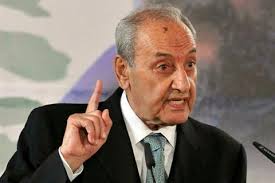 BEIRUT – The March 14 coalition is opposed to the early election of a president in Lebanon as proposed by speaker Nabih Berri , a newspaper report said Tuesday.
BEIRUT – The March 14 coalition is opposed to the early election of a president in Lebanon as proposed by speaker Nabih Berri , a newspaper report said Tuesday.
“The circumstances that led to an early presidential election in 1976 are not present today, and therefore there is no justification for such a proposal,” a report published by Kuwaiti daily Al-Anbaa quoted March 14 sources as saying.
“In 1976, a civil war was raging and one Lebanese side was calling for the resignation of President Suleiman Franjieh, accusing him of supporting the other side.”
“The resolution came on the basis of the election of President Elias Sarkis, six months before the end of the mandate of Franjieh, to secure his departure from office in due time.”
The sources added that the current president, Michel Suleiman, cannot be accused “by the sides linked to the Syrian-Iranian axis” of national and patriotic shortcomings.
“In addition to that, Sarkis was the proposed as a consensus candidate in 1976, while today there is no consensus over the formation of a new government nine months after the nomination [of a premier-designate], let alone an agreement over a presidential candidate.”
On Monday Berri, a key ally of the Iranian backed Hezbollah militant group said a replacement for Suleiman could be elected prior to the beginning of the presidential election period, which begins on March 25.
He argued that the precedent set in past Lebanese elections allows for the election of a president before the two-month constitutionally mandated voting period, which precedes the end of a president’s term.
Meanwhile, the Kuwaiti daily reported that March 14 was discussing the establishment of a committee tasked with devising a strategy for implementing its “civil resistance.”
According to the report, the March 14 strategy will also tackle the presidential election issue during the parliamentary election session.
It added that the coalition rejects the election of a president with a simple parliamentary majority.
“A imminent political and diplomatic campaign will be launched by March 14 under the banner of Lebanon’s neutrality, and the reactivation of international resolutions such as UN Security Council Resolutions 1559 and 1701.”
Lebanon has been struggling for months with the formation of a new cabinet since the resignation of caretaker PM Najib Mikati last April. Salam has cited the pre-conditions imposed by the opposing March 14 and March 8 blocs as a reason behind the delays in the process.
President Michel Suleiman said on Monday during a speech from Beirut’s Chamber of Agriculture, Commerce and Trade that he is in favor of forming a non-political cabinet, a move strongly opposed by the Hezbollah led-March 8 parties.
“Don’t the Lebanese who are not affiliated with any party have the right to contribute to reviving the country?” Suleiman said in reference March 8 objection to a neutral cabinet.
Lebanon’s constitution stipulates that the president and premier-designate can sign decrees approving a government, but the parliament holds final sway on its activation with a vote of confidence.
Even if a new cabinet did not receive a vote of confidence, it would replace Mikati’s resigned government as the caretaker cabinet.
The formation of a fait accompli cabinet is likely to prompt a violent reaction from Hezbollah and its March 8 allies, Al-Akhbar newspaper which is closely linked to Hezbollah and the Syrian regime reported last Monday .
NOW/Agencies

Leave a Reply
You must be logged in to post a comment.